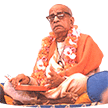Penance - an essential subject: Difference between revisions
(Created page with "Category:Essential Subjects <!----------------------- edit below this line -----------------------> <!------------------------ begin introduction text below --------------...") |
(Vanibot #0041: Moves Choose Another box to the end) |
||
| Line 2: | Line 2: | ||
<!----------------------- edit below this line -----------------------> | <!----------------------- edit below this line -----------------------> | ||
<!------------------------ begin introduction text below ------------------------> | <!------------------------ begin introduction text below ------------------------> | ||
One should be satisfied with whatever is obtained by the grace of the Supreme Lord; that is called satisfaction. Tapas means austerity or penance. There are many rules and regulations in the Vedas which should be applied, like rising early in the morning and taking a bath. Sometimes it is very troublesome to rise early in the morning, but whatever voluntary trouble one may suffer in this way is called penance. Similarly, there are prescriptions for fasting on certain days of the month. One may not be inclined to practice such fasting, but because of his determination to make advancement in the science of Kṛṣṇa consciousness, he should accept such bodily troubles when they are recommended. However, one should not perform Penance unnecessarily or against Vedic injunctions. | |||
Srila Prabhupada's books, lectures, conversations and letters offer a comprehensive presentation of this essential subject as seen in the Vaniquotes '''[[Vaniquotes:Category:Penance|Penance]]''' category. An introduction from his books is given below in the following | Srila Prabhupada's books, lectures, conversations and letters offer a comprehensive presentation of this essential subject as seen in the Vaniquotes '''[[Vaniquotes:Category:Penance|Penance]]''' category. An introduction from his books is given below in the following 8 quotes. | ||
<!-------- end introduction text and don't touch next three lines ---------> | <!-------- end introduction text and don't touch next three lines ---------> | ||
---- | ---- | ||
== Quotes from Srila Prabhupada's books == | == Quotes from Srila Prabhupada's books == | ||
<!----------------- edit quote boxes below this line -----------------> | <!----------------- edit quote boxes below this line -----------------> | ||
{{VaniQuotebox| | {{VaniQuotebox|Anything done as sacrifice, charity or penance without faith in the Supreme, O son of Prtha, is impermanent. It is called asat and is useless both in this life and the next|Anything done as sacrifice, charity or penance without faith in the Supreme, O son of Pṛthā, is impermanent. It is called asat and is useless both in this life and the next. Anything done without the transcendental objective—whether it be sacrifice, charity or penance—is useless. Therefore in this verse it is declared that such activities are abominable. '''(Bhagavad-gītā 17.28)'''}} | ||
{{VaniQuotebox| | {{VaniQuotebox|There (in the Brahma-vaivarta Purana) it is said that Vyasadeva maintained the daughter of Jabali as his wife and that after they performed penances together for many years, he placed his seed in her womb|There it is said that Vyāsadeva maintained the daughter of Jābāli as his wife and that after they performed penances together for many years, he placed his seed in her womb. The child remained in the womb of his mother for twelve years, and when the father asked the son to come out, the son replied that he would not come out unless he were completely liberated from the influence of māyā. '''(Śrīmad-Bhāgavatam 9.21.25)'''}} | ||
{{VaniQuotebox| | {{VaniQuotebox|The Supreme Personality of Godhead cannot be realized by any amount of Vedic knowledge or by any number of penances. But a pure devotee of the Lord like Narada can deliver the Supreme Lord by his good will|The Supreme Personality of Godhead cannot be realized by any amount of Vedic knowledge or by any number of penances. But a pure devotee of the Lord like Nārada can deliver the Supreme Lord by his good will. The very name Nārada suggests that he can deliver the Supreme Lord. Nāra means the "Supreme Lord," and da means "one who can deliver. '''(Śrīmad-Bhāgavatam 3.12.23)'''}} | ||
{{VaniQuotebox| | {{VaniQuotebox|The penance of devotional service includes knowledge and detachment, and that is the manifestation of the transcendental potency|The devotees automatically become detached from worldly enjoyment, and this detachment is the result of perfect knowledge. Therefore the penance of devotional service includes knowledge and detachment, and that is the manifestation of the transcendental potency. '''(Śrīmad-Bhāgavatam 2.9.23)'''}} | ||
{{VaniQuotebox| | {{VaniQuotebox|Krsna advised Arjuna to throw the head of Jayadratha directly onto the lap of his father, who was engaged in penances at the Samanta-pancaka pilgrimage. This was actually done by Arjuna|He therefore advised Arjuna to throw the head of Jayadratha directly onto the lap of his father, who was engaged in penances at the Samanta-pañcaka pilgrimage. This was actually done by Arjuna. Jayadratha's father was surprised to see a severed head on his lap, and he at once threw it to the ground. '''(Śrīmad-Bhāgavatam 1.15.16)'''}} | ||
{{VaniQuotebox| | {{VaniQuotebox|Krsna consciousness is awakened by different types of sacrifices to the demigods, sacrifice to Brahman, sacrifice in celibacy, in household life, in controlling the senses, in practicing mystic yoga, in penance, in forgoing material possessions|Kṛṣṇa consciousness is awakened by different types of sacrifices to the demigods, sacrifice to Brahman, sacrifice in celibacy, in household life, in controlling the senses, in practicing mystic yoga, in penance, in forgoing material possessions, in studying the Vedas, and in partaking of the social institution called varṇāśrama-dharma. '''(Bhagavad-gītā 4.42)'''}} | ||
{{VaniQuotebox| | {{VaniQuotebox|Brahma, disgusted with the Rudra generations and afraid of being devoured by the increase of population, asked Rudra to stop producing such an unwanted generation and take to penance for attaining the favor of the Supreme Lord|Brahmā, disgusted with the Rudra generations and afraid of being devoured by the increase of population, asked Rudra to stop producing such an unwanted generation and take to penance for attaining the favor of the Supreme Lord. We find, therefore, in pictures, that Rudra is always sitting in meditation for the attainment of the favor of the Lord. '''(Śrīmad-Bhāgavatam 3.12.19)'''}} | ||
{{VaniQuotebox| | {{VaniQuotebox|Brahma underwent penance for one thousand years of the demigods before he realized by the grace of Krsna how to create|Brahmā underwent penance for one thousand years of the demigods before he realized by the grace of Kṛṣṇa how to create. Then from Brahmā came Sanaka, Sananda, Sanātana and Sanat-kumāra, then Rudra, and then the seven sages, and in this way all the brāhmaṇas and kṣatriyas are born out of the energy of the Supreme Personality of Godhead. '''(Bhagavad-gītā 10.6)'''}} | ||
<!----------------- edit quote boxes above this line -----------------> | <!----------------- edit quote boxes above this line -----------------> | ||
| Line 31: | Line 31: | ||
'''Penance - [[Vaniquotes:Category:Penance|explore more within this category]]'''. | '''Penance - [[Vaniquotes:Category:Penance|explore more within this category]]'''. | ||
{{EsentialSubjectTotal}} | {{EsentialSubjectTotal}} | ||
<div style="float:left;"> | |||
{{EssentialSubjectnav}} | |||
</div> | |||
__NOTOC__ | __NOTOC__ | ||
__NOEDITSECTION__ | __NOEDITSECTION__ | ||
Latest revision as of 17:07, 22 November 2020
One should be satisfied with whatever is obtained by the grace of the Supreme Lord; that is called satisfaction. Tapas means austerity or penance. There are many rules and regulations in the Vedas which should be applied, like rising early in the morning and taking a bath. Sometimes it is very troublesome to rise early in the morning, but whatever voluntary trouble one may suffer in this way is called penance. Similarly, there are prescriptions for fasting on certain days of the month. One may not be inclined to practice such fasting, but because of his determination to make advancement in the science of Kṛṣṇa consciousness, he should accept such bodily troubles when they are recommended. However, one should not perform Penance unnecessarily or against Vedic injunctions.
Srila Prabhupada's books, lectures, conversations and letters offer a comprehensive presentation of this essential subject as seen in the Vaniquotes Penance category. An introduction from his books is given below in the following 8 quotes.
Quotes from Srila Prabhupada's books
Penance - explore more within this category.
Vanipedia has now over 903 introductory articles compiled from Srila Prabhupada's books under the series titled Essential Subjects. All these articles can be seen in the Table of Content on the right side of this article and also here in this Umbrella Category. Browse through them to relish the breadth and depth of Srila Prabhupada's teachings - There is a subject for everyone.







